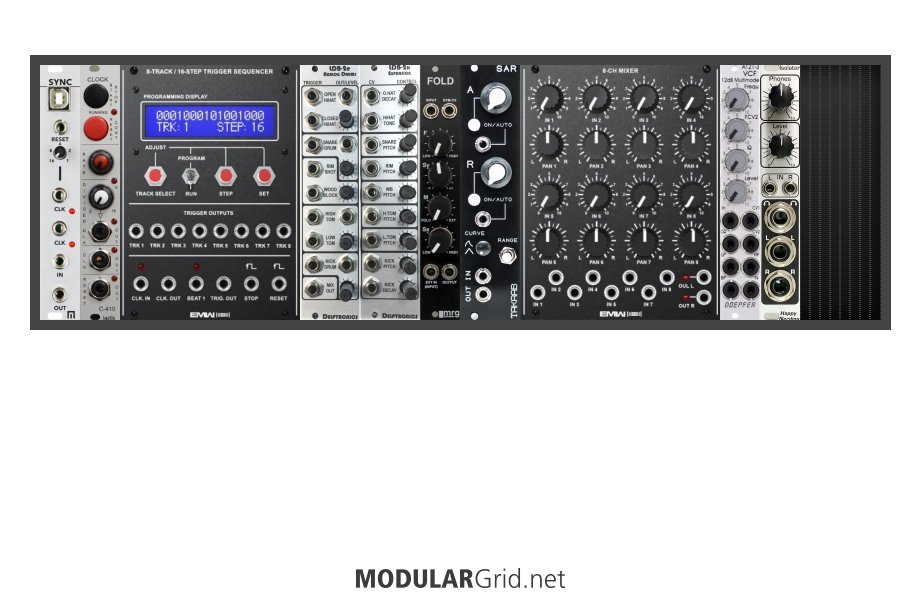Hi, so I’d like to eventually build a drum rack and wanted to see if it’s possible to track say 8 or more modules individually. Anything out there with multiple outs so I could connect to a mixer or interface?
Grateful for your time!
Hi, so I’d like to eventually build a drum rack and wanted to see if it’s possible to track say 8 or more modules individually. Anything out there with multiple outs so I could connect to a mixer or interface?
Grateful for your time!
I'd not worry too much about an 'audio interface module' - they aren't necessarily needed
first: try the individual modules
if you get clipping (unwanted/unintended distortion) then try second: if your audio interface or mixer has a pad function try this - otherwise try passive attenuators or vcas (you hopefully already have these, but if not attenuators are inexpensive)
if you are still getting clipping then try third: output modules - the bad news is not all are the same - if you've got to this point and your audio interface or mixer is expecting balanced signals - then look towards either ladik or happy nerding as they have some relatively inexpensive dual ones - you might want to look at the brand nw2s - they have some audio interfaces (including balanced ones) with a lot of i/o - other than that I don't think there's a whole lot of options - if it's not expecting balanced signals - then I would try to determine the source of the noise - it could be ground loops - there's a lot been written on that - in which case I believe it would be really useful to look at upgrading your audio interface/mixer to balanced i/o
"some of the best base-level info to remember can be found in Jim's sigfile" @Lugia
Utility modules are the dull polish that makes the shiny modules actually shine!!!
sound sources < sound modifiers < modulation sources < utilities
If you want run them into your daw, check out the ES-8 or ES-9 modules from expert sleepers. They’re Eurorack format audio interfaces with a lot of i/o. Super useful especially for small or hybrid setups.
I can't recommend building a drum machine setup within a modular. The problem becomes apparent when you look at the problem purely from a fiscal standpoint.
For example, let's look at Uli's recent redux of the Roland TR-808. This gives you sync I/O, each voice has an output, got MIDI and USB, etc. Cost = $329.
Now, let's build a VERY SIMPLE module complement for doing as much as the RD-8 above (hint: it can't):

Now, that contains most of the RD-8's sound complement, clocking, the VCF and waveshaper, stereo mixer, and stereo out with a headphone preamp. Even trying to keep the cost as low as possible, this still comes in at $1182. That's a difference of $853.
How many drum machines does $853 buy, hmmm?
Further to JimHowell1970's comment above -
After messing with a lot of different methods, I can say that the nw2s:016 is the best tool to get audio into a signal level and format pro-level audio interfaces prefer. If you need multi-channel with the intent to multitrack, don't mess around with multiple stereo modular-to-line level modules (this will always end up costing more than nw2s); and the USB interface and Modular-to-ADAT modules (ie. Expert Sleepers, Birdbrain etc..) on the market right now just don't compare (sound quality, noise floor, sampling rates) to the ADCs inside interfaces from Focusrite, MOTU or Universal Audio.
For live purposes, many mixers can pad down modular levels - but having 16 jacks in your system with the nw2s:016 is so convenient, and connects easily with two DB25 snake cables to your mixer at a perfect line level your mixer will love.
Yep...although, there's always the cheaper alternative: use an "outdated" DAW interface (like the MOTU 828mkii I use) and some software (like Ableton's CV Tools, MOTU's Volta, etc) that can deal with incoming and outgoing control signals. That way, if you need to gig live, just use the saved voltage info in the track and connect things appropriately. You just have to make 100% sure that the interface in question is DC coupled, otherwise this gets difficult.